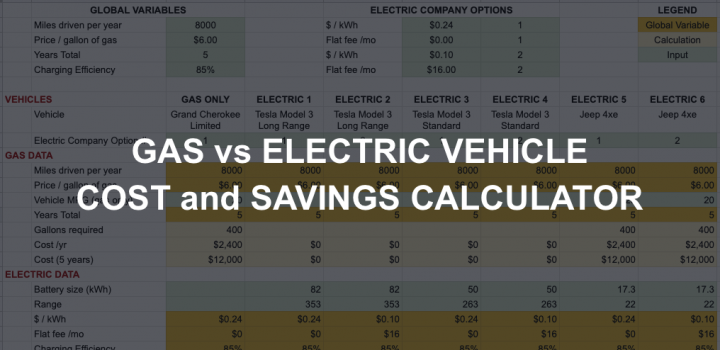
It’s spreadsheet time!
Every once in a while I need to build a spreadsheet to help me understand the math behind a decision so I can make a more informed choice. Ok, it happens way more than every once in a while. Regardless, you get to benefit!
Why did I build this thing?
Because I couldn’t get a straight-forward answer that applied to my specific situation. Should I buy an electric vehicle? Which one? More importantly, WHY? Sure, you can ask online and people will give you their opinions. But, does that “advice” take into account any of the following?
- The cost of the electric vehicle?
- The MPG of existing gas vehicle (and/or the cost of a new one)?
- The cost of electricity locally for you and what it costs to “fill the tank”?
- How many miles per year you drive?
- What you expect the cost of gas to be over the next 5-10 years?
- The size of the battery in the vehicle you’re considering, and it’s range?
- The charging efficiency of the vehicle?
- Is it a hybrid? How much gas vs. electric will you use?
- The various types of vehicles you may be considering? Tesla’s various models, Jeep 4xe hybrid, Prius, Rivian, or any of the new players coming to market soon.
My guess is most of the online advice does not take these factors into account. They certainly don’t give you a spreadsheet and a how-to video to use!
I wanted something flexible (that wouldn’t require me to re-build the spreadsheet every time I have a new idea), and I wanted it to be simple to use (so that most people can input some basic information and get easy to follow results).
Then I thought to myself, I bet there are other folks who might want something like this. So, here ya go!
THE SPREADSHEET

Take a look at the read-only copy of the Google spreadsheet. Once you open the file, click: File -> Make a Copy. Once saved to your local Google Drive you simply fill in the green parts and modify to your liking!
The main sections of the spreadsheet include:
- The vehicles you’re considering
- The pricing plans available to you from your electric company
- Gas vehicle data options
- Electric vehicle data options
- The cost of “filling up” the various vehicles
- Expected usage of gas vs electric (for hybrids)
- The cost per mile for each option
- Cost savings vs. your baseline vehicle over time
The How-To Video
You’ll be up and running with this spreadsheet in just a few minutes!
What it Does Not Account For
- [UNDER CONSIDERATION] Federal, state tax credits or other incentives. For the time being, simply subtract those benefits from your “Cost of Vehicle” column.
- On the flip side, there are apparently some surcharges out there for having an electric vehicle too.
- [UNDER CONSIDERATION] The cost of purchasing a charging system, and/or upgrading electrical if necessary. For now, this can be manually added to the “Cost of Vehicle” section.
- The cost of maintaining a vehicle. Typically gas-powered vehicles have more moving parts and require more maintenance. This can result in higher maintenance costs over time vs. electric vehicles.
- Many electric vehicles are not very efficient in cold weather compared to warm weather. The system doesn’t have a way to account for this today. For now you can adjust the “Range” column to account for this.
- Solar power at your home. You’ll have to do the math yourself and fill in the “Electric Company” section. Similar with regards to what you might pay at a remote charging station (i.e. on a trip or at work). You’ll have to do your own math here.
- The fun factor! Every electric vehicle has its own level of fun factor that simply can’t be measured by a spreadsheet.
Any Feedback for Me?
This is the first version. Did I miss something? Is a calculation wrong? Would you like to see something new added? Hit me up on Twitter @ALBsharah!